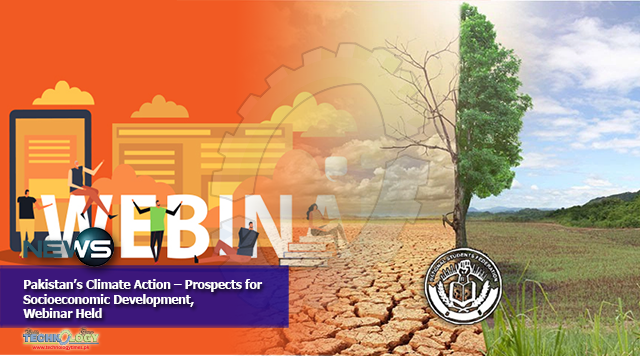They mentioned that the outcome of Pakistan’s climate action would contribute to the regional and global targets detailed in the relevant Sustainable Development Goal (SDG-13) in enormous ways.

Environmental experts while speaking to a webinar participants have expressed that Pakistan’s green initiatives would bring positive change in the local environment, reduce vulnerability to natural disasters, and improve social health and economic conditions if implemented in letter and spirit.
They mentioned that the outcome of Pakistan’s climate action would contribute to the regional and global targets detailed in the relevant Sustainable Development Goal (SDG-13) in enormous ways.
However, they said, the success of the initiatives depend on the effective role of provincial and local authorities, communities and other stakeholders and partners. Development Communications Network (Devcom-Pakistan) and DTNTV organised the webinar on the subject “SDG-13: Pakistan’s Climate Action – Prospects for Socioeconomic Development” on Saturday.
Devcom-Pakistan and DTNTV Director Munir Ahmed hosted and conducted the webinar. Malik Amin Aslam, Federal Minister and Prime Minister’s Advisor on Climate Change, was the keynote speaker.
The panel of experts included Asian Development Bank Climate Scientist and former chair of the National Climate Change Taskforce Dr Qamar-uz-Zaman Chaudhary, Sustainable Development Policy Institute (SDPI) Executive Director Dr Abid Qayyum Suleri, EMC Chief Operating Officer and former Director General Pak EPA Asif Shuja Khan.
Malik Amin Aslam said: All SDGs are interconnected, so the highly significant initiatives and achievements on Pakistan’s climate action agenda would not be contributing to the SDG-13 but these interventions would have positive effect on other SDGs too. Our green initiatives have been admired by all leading forums and organisations including IUCN, WWF, and World Economic Forum.
Citing the Pakistan government interventions, Malik said, Pakistan’s continuous efforts and initiatives of large-scale afforestation, biodiversity conservation, investment in clean energy, electric vehicles and green jobs to combat climate change impacts have earned the country worldwide acclaim.
He said, the 10 Billion Tree Tsunami Programme, Clean Green Pakistan Initiative, Clean Green Pakistan Index, Protected Areas Initiative adding nine more national parks to the existing six, Ecosystem Restoration Fund for facilitating green growth and policies consistent with the objectives of Pakistan’s Nationally Determined Contribution and attaining Land Degradation Neutrality.
These initiatives have been taken to prevent and to be better prepared for the threat of climate change experienced by the country such as floods, heat waves, droughts and melting glaciers. Malik mentioned that Transition to a green economy and green future is at the core of Pakistan government’s policies spearheaded by Prime Minister Imran Khan.
The government has initiated steps to “convert China Pakistan Economic Corridor (CPEC) project into the China Pakistan Green Economic Corridor project.” “We have deferred 2740 MW of imported coal projects signed by the previous government and replaced it by zero-carbon and hydropower projects of 3700 MW.
Government’s shifting to clean energy shows its commitment to climate-friendly and sustainable development beneficial for both Pakistan and the global community. All the benefits of Pakistan’s Climate Action would also harness socioeconomic benefits at the grassroots level where an improved environment would also contribute to health and hygiene, Malik added.
Dr Qamar-uz-Zaman Chaudhary, Asian Development Bank Climate Scientist and former chair of the National Climate Change Taskforce, said: Climate change is a bigger challenge than the Covid-19 pandemic.
Fast depleting natural resources would hamper the socioeconomic fiber of the society that would lead to intensive internal migration towards the areas having better economic prospects.
He said only sustainability of the government’s climate initiatives would add value to the socioeconomic indicators. Engagement of local governance and communities would make them a big success. We have cut down 20 percent of our carbon emission under the Paris agreement while the green initiatives would enable us to do much more than the actual target.
Dr Abid Qayyum Suleri, Executive Director of the Sustainable Development Policy Institute (SDPI), said: Socioeconomic impact of Pakistan’s Climate Action interventions depend purely on its sustainability.
In the age of cartels and mafias, the government has to be vigilant if the multinationals and corporates are taking the government directions and notifications seriously.
Originally published at The news international